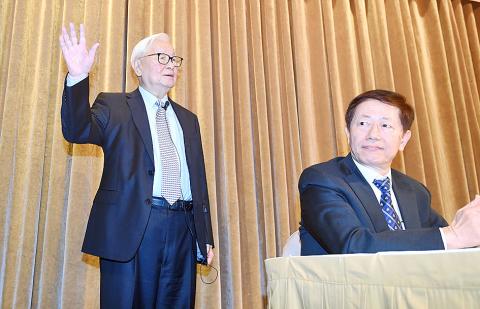Taiwan Semiconductor Manufacturing Co (TSMC, 台積電), the world’s largest contract chipmaker, yesterday posted a record-breaking net profit of NT$343.11 billion (US$11.61 billion) for last year, benefiting from robust chip demand for smartphones and cryptocurrency mining machines.
That represented an annual growth of 2.65 percent from NT$334.25 billion in 2016, according to the chipmaker’s financial statement. Earnings per share rose to NT$13.23 from NT$12.89.
While the pace of growth decelerated from 2016’s 10 percent increase, the chipmaker expects the growth momentum to carry on this year.

Photo: Liao Chen-huei, Taipei Times
This year will be “an above-average year,” TSMC founder and chairman Morris Chang (張忠謀) told investors at his last appearance at the company’s quarterly earnings conference.
Chang is set to retire this summer.
Revenue growth would accelerate to between 10 and 15 percent this year in US dollar terms, following a 9 percent increase last year, Chang said.
That would be faster than the company’s five-year target of compound annual growth of between 5 and 10 percent from last year to 2021.
Chang said he expects growth to be fueled by three of the firm’s growth platforms: high-performance computing (HPC), Internet of Things and automotive.
Replacing mobile phone chips, “HPC chips will grow the strongest due to continuing expansion of AI [artificial intelligence] applications in all electronic devices, as well as continuing demand for cryptocurrency GPU [graphics processor unit] and etc,” Chang said in English.
“The urge to mine cryptocurrency is very strong. The [cryptocurrency] price is very volatile, but the demand since the last year has been very strong. We expect it will continue to be strong,” he said.
“However, we will size the demand carefully,” he added.
Mobile phone chips, the biggest revenue contributor to TSMC, would see little growth this year, he predicted.
Based on Chang’s growth projection, TSMC would again outperform the global semiconductor industry’s projected annual growth of between 6 and 8 percent, and the foundry sector’s annual growth of between 9 and 10 percent this year.
However, due to the smartphone industry’s slow-season effect, TSMC expects revenue to shrink by 8.3 percent sequentially this quarter to between US$8.4 billion and US$8.5 billion.
Gross margin is expected to reach between 49.5 percent and 51 percent this quarter, compared with 50 percent last quarter, TSMC said.
The company’s net profit dropped 0.9 percent to NT$99.29 billion in the final quarter of last year, compared with a record-high NT$100.2 billion in the fourth quarter of 2016.
The company attributed the contraction to a 1.5 percent appreciation of the New Taiwan dollar against the US dollar.
On a quarterly basis, net profit increased 10.4 percent from NT$89.93 billion, the company’s financial statement showed.
To support the company’s growth and customer demand, TSMC plans to spend between US$10.5 billion and US$11 billion this year, mainly on new equipment for 7-nanometer manufacturing and developing 5-nanometer technology.
TSMC is on track to start mass production of its 7-nanometer chips — mostly for smartphones and AI applications — next quarter, TSMC cochief executive C.C. Wei (魏哲家) told the conference.
The 7-nanometer chips are to account for 10 percent of the company’s total revenue this year, Wei said.

Nvidia Corp chief executive officer Jensen Huang (黃仁勳) on Monday introduced the company’s latest supercomputer platform, featuring six new chips made by Taiwan Semiconductor Manufacturing Co (TSMC, 台積電), saying that it is now “in full production.” “If Vera Rubin is going to be in time for this year, it must be in production by now, and so, today I can tell you that Vera Rubin is in full production,” Huang said during his keynote speech at CES in Las Vegas. The rollout of six concurrent chips for Vera Rubin — the company’s next-generation artificial intelligence (AI) computing platform — marks a strategic

REVENUE PERFORMANCE: Cloud and network products, and electronic components saw strong increases, while smart consumer electronics and computing products fell Hon Hai Precision Industry Co (鴻海精密) yesterday posted 26.51 percent quarterly growth in revenue for last quarter to NT$2.6 trillion (US$82.44 billion), the strongest on record for the period and above expectations, but the company forecast a slight revenue dip this quarter due to seasonal factors. On an annual basis, revenue last quarter grew 22.07 percent, the company said. Analysts on average estimated about NT$2.4 trillion increase. Hon Hai, which assembles servers for Nvidia Corp and iPhones for Apple Inc, is expanding its capacity in the US, adding artificial intelligence (AI) server production in Wisconsin and Texas, where it operates established campuses. This

Garment maker Makalot Industrial Co (聚陽) yesterday reported lower-than-expected fourth-quarter revenue of NT$7.93 billion (US$251.44 million), down 9.48 percent from NT$8.76 billion a year earlier. On a quarterly basis, revenue fell 10.83 percent from NT$8.89 billion, company data showed. The figure was also lower than market expectations of NT$8.05 billion, according to data compiled by Yuanta Securities Investment and Consulting Co (元大投顧), which had projected NT$8.22 billion. Makalot’s revenue this quarter would likely increase by a mid-teens percentage as the industry is entering its high season, Yuanta said. Overall, Makalot’s revenue last year totaled NT$34.43 billion, down 3.08 percent from its record NT$35.52

PRECEDENTED TIMES: In news that surely does not shock, AI and tech exports drove a banner for exports last year as Taiwan’s economic growth experienced a flood tide Taiwan’s exports delivered a blockbuster finish to last year with last month’s shipments rising at the second-highest pace on record as demand for artificial intelligence (AI) hardware and advanced computing remained strong, the Ministry of Finance said yesterday. Exports surged 43.4 percent from a year earlier to US$62.48 billion last month, extending growth to 26 consecutive months. Imports climbed 14.9 percent to US$43.04 billion, the second-highest monthly level historically, resulting in a trade surplus of US$19.43 billion — more than double that of the year before. Department of Statistics Director-General Beatrice Tsai (蔡美娜) described the performance as “surprisingly outstanding,” forecasting export growth